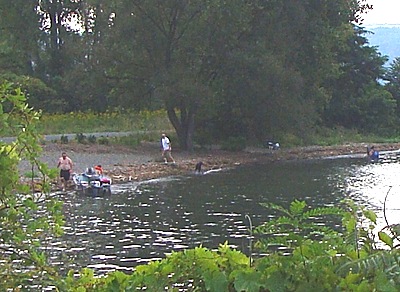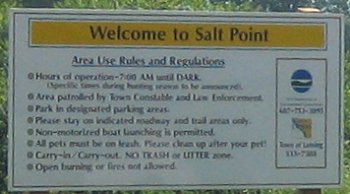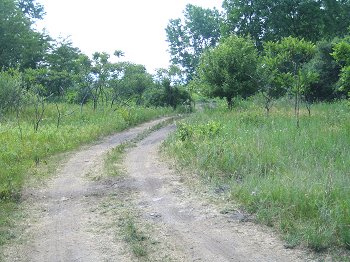- By Dan Veaner
- News
 Print
Print
Lansing's Town Board passed a new local law last week that consolidates rules and governs behavior in all of the Town parks. The law was prompted by new regulations the Town will enforce at Salt Point now that the Town's lease with the New York State Department of Environmental Conservation (DEC) is in force, but it covers all parks in Lansing. "One of the requirements of the DEC was that we actually control activities there by setting forth management plans, rules, and regulations," says Town Attorney Guy Krogh. "It's high time given the density and use of the Town that there be some rules and regulations to govern conduct in all the parks, and that's what this law attempts to do."
Salt Point is a problem area because it has been largely unregulated for years. Town officials have already faced challenges in transforming it from a place plagued with littering and crime to a peaceful, walkable park. Almost a month ago a group of young people were injured when their pickup truck overturned at Salt Point. And after the Highway Department distributed soil onto the pitted dirt roads there to prepare them to be converted to nature trails or planted areas, they returned the next day to find their work undone. "Someone had the audacity to bring a tractor with a front end blade and plow all the dirt out," says Town Supervisor Steve Farkas. "They scooped it out so they could drive. We have to come up with an enforceable plan."
Resistance to the taming of Salt Point has plagued officials since they began transforming the area in early Spring. Two large posts were installed as part of an entry gate that will be used to close the park in off-hours. One of the posts was stolen the night after it had been put in. "At first we had decided to put a fence up there and lock it at night," explains Deputy Supervisor Bud Shattuck. "We decided to keep it open, hoping that just the patrol of our constable would be enough. Apparently it's not. We've asked the Highway Department to put the fence back up. Now I think our board needs to discuss what the hours of operation are going to be and who is going to lock and unlock it."
It will take more than a fence to enforce the new law. The Town contracts with Constable Scott Ferris to patrol the parks and 14 miles of Cayuga Lake, as well as to maintain order in the Town court. But as the only law enforcement officer employed by the Town he can't be everywhere at once. Officials set up a meeting with Ferris, Parks Superintendent Steve Colt, Environmental Planner Darby Kiley, and Highway Superintendent Jack French this week to come up with an enforcement plan. "Our courts need direction as to what we're going to do," says Farkas. "We've got to come up with ways of enforcing the regulations down there."
One of those ways will be to shut Salt Point down at night. "It has to be locked down for a while just until people get the idea," Farkas says. "Before somebody really gets hurt we have to shut it down, lock it down, until people find out that you've got to treat it differently than a place to burn things and drive vehicles all over the place."
The law sets forth general rules for conduct in all the parks, but includes specific rules that recognize that individual parks may have specific uses. For example, fishing is permitted at Myers Park, Salt Point, and Ludlowville Park, but hunting is prohibited in all parks except Salt Point. There are limitations on the use of alcohol, the kinds of vehicles allowed in the parks, and prohibitions against construction, excavation, and defacement. Use of waterways and streams are defined, and rules that govern hunting and fishing, fireworks and explosives, camping, fires, gambling, games and toys, aircraft, commercial activities, and special events.
A section on animals lays out what animals are allowed in the parks, and how owners are expected to contain and clean up after them. An appendix to the law lays out fees for renting pavilions, park admission, launching boats, and marina slip rentals. Most of the rules and fees have existed in some form, but the law consolidates them and gives the Town a law that is enforceable.
"It sets forth the civil and criminal fines for violation of the law," Krogh says. "If you are a regular user of the park these rules aren't really going to touch you. But if you are someone who wants to light off fireworks in the park, you're going to have an issue."
----
v3i24
| Click here for the full text of the parks and recreation law How Many Broken Laws Can You Find In This Picture?  The Star stopped by Salt Point on Wednesday and found many violations of the parks law. These men were breaking at least three aspects of the law by driving and parking off of the designated roadway, swimming in an area that is not identified as a 'designated swimming area,' and blasting their truck radio at high volume. It is parked next to the remains of a bonfire, another violation. |
Resistance to the taming of Salt Point has plagued officials since they began transforming the area in early Spring. Two large posts were installed as part of an entry gate that will be used to close the park in off-hours. One of the posts was stolen the night after it had been put in. "At first we had decided to put a fence up there and lock it at night," explains Deputy Supervisor Bud Shattuck. "We decided to keep it open, hoping that just the patrol of our constable would be enough. Apparently it's not. We've asked the Highway Department to put the fence back up. Now I think our board needs to discuss what the hours of operation are going to be and who is going to lock and unlock it."
 The entry sign says parking is permitted in designated parking areas only. But it is not clear that older dirt roads are not designated -- there are no barriers or signage to distinguish them from the new stone road, the one road where vehicles are allowed at Salt Point. |
It will take more than a fence to enforce the new law. The Town contracts with Constable Scott Ferris to patrol the parks and 14 miles of Cayuga Lake, as well as to maintain order in the Town court. But as the only law enforcement officer employed by the Town he can't be everywhere at once. Officials set up a meeting with Ferris, Parks Superintendent Steve Colt, Environmental Planner Darby Kiley, and Highway Superintendent Jack French this week to come up with an enforcement plan. "Our courts need direction as to what we're going to do," says Farkas. "We've got to come up with ways of enforcing the regulations down there."
One of those ways will be to shut Salt Point down at night. "It has to be locked down for a while just until people get the idea," Farkas says. "Before somebody really gets hurt we have to shut it down, lock it down, until people find out that you've got to treat it differently than a place to burn things and drive vehicles all over the place."
 Old dirt roads like this one will be filled in and planted, or converted to walking trails. |
The law sets forth general rules for conduct in all the parks, but includes specific rules that recognize that individual parks may have specific uses. For example, fishing is permitted at Myers Park, Salt Point, and Ludlowville Park, but hunting is prohibited in all parks except Salt Point. There are limitations on the use of alcohol, the kinds of vehicles allowed in the parks, and prohibitions against construction, excavation, and defacement. Use of waterways and streams are defined, and rules that govern hunting and fishing, fireworks and explosives, camping, fires, gambling, games and toys, aircraft, commercial activities, and special events.
A section on animals lays out what animals are allowed in the parks, and how owners are expected to contain and clean up after them. An appendix to the law lays out fees for renting pavilions, park admission, launching boats, and marina slip rentals. Most of the rules and fees have existed in some form, but the law consolidates them and gives the Town a law that is enforceable.
"It sets forth the civil and criminal fines for violation of the law," Krogh says. "If you are a regular user of the park these rules aren't really going to touch you. But if you are someone who wants to light off fireworks in the park, you're going to have an issue."
----
v3i24



